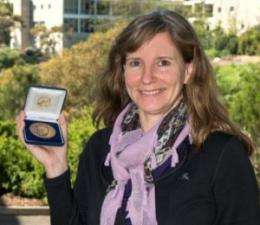Refine teaching to improve scientific literacy: Biologist studies Australian and American systems

Biologist Karen Burke Da Silva (pictured), who recently returned from a Churchill Fellowship in America, is on a quest to increase Australia's levels of scientific literacy.
Scientific literacy, Ms Burke Da Silva says, consists of attaining the knowledge to understand the range of scientific issues and debates affecting society, from global warming to stem cells and cloning.
The benefits of scientific literacy can operate at the level of the individual, such as understanding options for medical treatment, through to broader issues, such as an appreciation of the vulnerability of ecosystems.
Under the current Australian system, students can give up science even before completing high school.
"Australia has a much lower scientific literacy than most countries in the Western world," said Ms Burke Da Silva, who is Associate Dean of Teaching and Learning in the Faculty of Science and Engineering.
By contrast, the American university system requires all university students to study science for at least one semester, which prompted Ms Burke Da Silva to visit the US on a Churchill Fellowship.
While the strategy results in higher levels of scientific literacy in the general population, Ms Burke Da Silva said surprisingly little thought has been given in the US to adapting science teaching specifically for non-scientists; teaching 'dumbed-down' versions of the core science curricula is assumed to be enough.
Ms Burke Da Silva believes a focus on refining teaching methods and content of first-year science topics is a key to improving students' engagement, retention levels and academic performance. At Flinders she teaches a topic called Biology and Society, which encourages students to analyse scientific information and provide critiques of contemporary science-based issues.
She is part of a growing Australia-wide network of university teachers that aims to strengthen student interest in science from the start of their degrees.
While many of the first-year students in biology and other sciences at Flinders come from courses that are not science-based, achieving a broader understanding of science and its role in society is just as important for those who intend to make it a career, Ms Burke Da Silva said.
"It's a good idea for science students to apply their knowledge beyond what they see through a microscope or in the lab," she said.
Provided by Flinders University
















